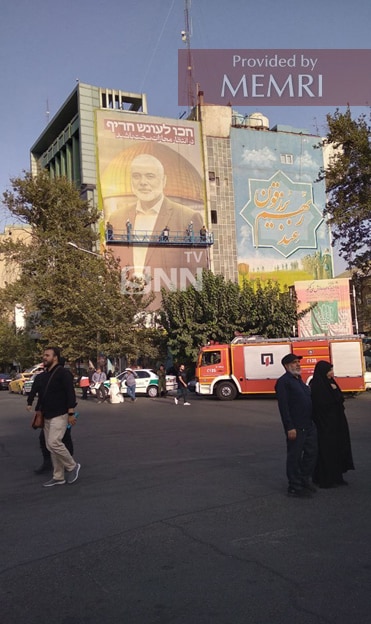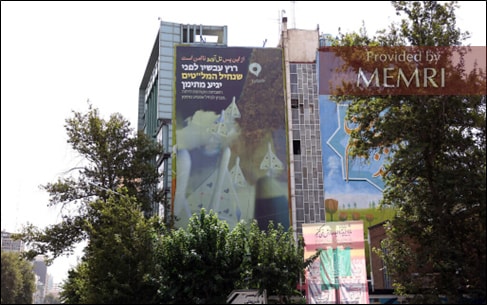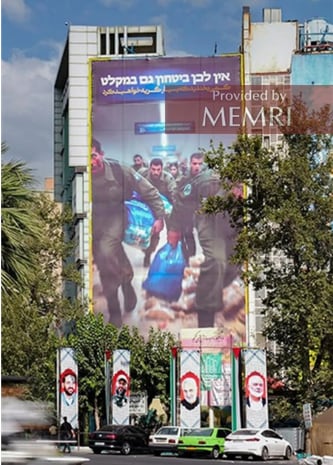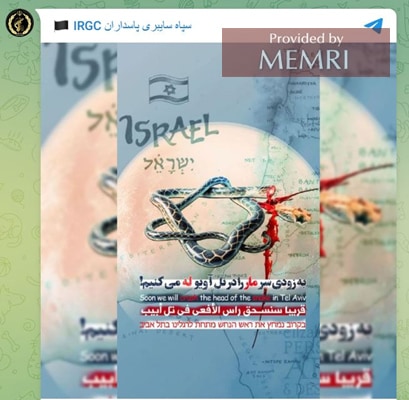Introduction
It appears that in the war being waged between Iran and Israel, Tehran prefers not to bring about all-out war – which it says Israel wants – and that it will thus not launch hundreds of missiles and drones at Israel as it did in April. This is because it fears a harsh Israeli response. Instead, it favors vengeance by means of its proxies, while extracting as much as it can from the Americans and Europeans in exchange for not going to war against Israel.
Tehran, which announced that it would wreak harsh retribution against Israel for the July 31, 2024 assassination of Hamas political bureau leader Isma'il Haniyeh in the city, is trying to find the right formula for vengeance that is "varied, integrated, and painful,"[1] and as such would allow Iran to claim that it has struck back at Israel according to "an eye for an eye."
To this end, the explanations that Tehran has given regarding how Haniyeh was assassinated in a guest house belonging to Iran's Islamic Revolutionary Guards Corps (IRGC) have been constantly evolving. This is both in order to be able to choose the form of reprisal that would assure Iran that it would significantly harm Israel without becoming entangled in a difficult war, and because of the attempts among the various security bodies to evade blame for the security oversight that allowed the assassination to take place. Iranian officials and media are also struggling with the question of how to effectively deter Israel, since the April 2024 "True Promise" missile and drone attack has clearly not done so. That attack was billed as a change in Iran's reaction policy vis-à-vis Israel – that is, from the use of proxies to direct attack – and top Iranian officials had claimed that from now on Iran would respond to Israeli attacks on it with direct attacks on Israel.
Tehran Is Wrestling With Choosing The Safest Revenge Against Israel For Minimum Cost And Maximum Benefit
At first, the regime claimed that Haniyeh's assassination was carried out by a missile launched from outside the country's borders, and then from one fired near the site of the assassination. Thus, the regime said that Israel would be struck with missiles and explosive drones coming from every direction, for a 360-degree threat. However, it was assessed that a move like this would prompt Israel to strike Iran hard. So, next the regime claimed that the assassination was carried out with an explosive device brought into Haniyeh's suite in the guest house under the IRGC's nose, with the assistance of IRGC members. This raised the possibility of a response comprising parallel Iranian attacks on sites in Israel and/or against the senior Israeli officials at home and abroad whom Iran said were responsible for the assassination. This option allows Tehran both to solicit the help of non-Iranian elements and to boast that it had carried out a smart, focused attack while at the same time warding off any Israeli military strike on it or its assets in the region.
To this end, the new president, Masoud Pezeshkian, was recruited to "persuade" Iranian Supreme Leader Ali Khamenei to strike specific targets only, so as to avoid a regional war and to protect Iran's security and interests in the face of demands by senior IRGC officials for an immediate response by missile attack on Israel regardless of the price Iran would pay.
According to reports, discussions in Iran's security leadership about the nature of the Iranian response raised additional possibilities. These include striking Israeli and Jewish interests around the world; delegating responsibility for a response to the resistance axis, particularly Hizbullah and the Houthis; leveraging the threat of a direct Iranian attack on Israel that would lead to regional war in negotiations with the U.S. with the aim of extracting Iranian nuclear achievements, securing the lifting of economic sanctions, obtaining a withdrawal of U.S. forces from the region, and other demands.
For example, the Kuwaiti newspaper Al-Jarida reported on August 9 that according to a source in Iran's Supreme National Security Council, the question of reprisal against Israel was still under discussion in Tehran, and that for any decision on an attack, officials were awaiting orders from Supreme Leader Khamenei. The source said that the U.S. had proposed to Iran to lift a significant part of the U.S. sanctions on Iran and return to the JCPOA nuclear agreement in exchange for Iran backing down from its intention to attack Israel. Iranian President Pezeshkian said in response that his country was prepared to postpone the retaliation until further notice based on the U.S. proposal on condition that it also includes a comprehensive ceasefire in Gaza and U.S. guarantees to stop any Israeli aggression against Iran and its allies. Pezeshkian said at a meeting of the Supreme National Security Council that he had coordinated this response with Khamenei, and that if the U.S. were to accept these conditions, he would persuade Khamenei to postpone the military response and to move ahead on individual retaliatory responses – that is, assassinating Israeli officials in reprisal for Israeli assassination of Iran-affiliated elements.[2]
It appears that Tehran, which always seeks to maximize political gains through military threat diplomacy, is continuing to warn about its right to an "appropriate response" to Israel and to pay only a price calculated to obtain political and economic gains from and boost its image vis-à-vis the Biden administration and Europe in order to buttress its forces in the Middle East. At the same time, isolated terror attacks on specific targets cannot be ruled out.
Meanwhile, Tehran is continuing to put up Hebrew-language billboards, banners, and murals across Tehran calling for vengeance, and publishing cartoons depicting the punishment awaiting Israel – its elimination by the resistance forces:

Mural of Haniyeh in Palestine Square, Tehran, with text in Hebrew and Farsi: "Await Heavy Punishment" (Source: X.com/IRIMFA_EN/status/1818886807880192158, August 1, 2024)

Mural of missiles in Tehran. Text in Farsi: "Tel Aviv is no longer safe"; in Hebrew: "Run now before the swarm of drones from Yemen [the Houthis] arrive," July 31, 2024.

Mural at Palestine Square in Tehran. Text in Farsi: "Smile for a while, because you will soon cry a lot"; in Hebrew, "You have no security even in your bomb shelter" (Pelikan.media/ni/2wQFG7Rydd54qHhsK, August 5, 2024)

Image shared by the IRGC on Telegram depicting the coming Iranian response to Haniyeh's assassination: The head of the Zionist snake is cut off by the resistance forces in the region. Below the image it says in English, Hebrew, Farsi, and Arabic: "Soon we will crush the head of the snake under our feet in Tel Aviv." (T.me/SEPAHCYBERY/96377, August 8, 2024)
Below are several examples from the debate in Iranian media about what Tehran's response to Haniyeh's assassination might be:
Moderate-Conservative Daily Jomhouri-e Islami: "How To Retaliate So That It Will Be True Vengeance But So We Will Not Fall Into The Trap That Is Set For Us" By Israel
An example of the current sentiment in Iran was an article published by the moderate conservative Jomhouri-e Islami daily on August 7. It stressed the need for Iran to create deterrence against Israel and to respond according to an "eye for an eye." It said:
"There is no doubt that Isma'il Haniyeh's assassination was a massive insult to Tehran, and there is no doubt that this crime must be avenged. But the most important thing is how to retaliate so that it will be true vengeance but so that we will not fall into the trap that is set for us [by Israel, which seeks to entangle Iran in a war]...
"The first and clearest point is that we are able to strike a blow equal to the one struck by the enemy, and to deter it from continuing to carry out crimes. Unfortunately, the previous operations ["True Promise," the April missile and drone attack on Israel] did not have these characteristics...
"Turning to operations that will drag us or the region into war will also not produce the desired result. [But] this does not mean that we fear war and must capitulate to the enemy's threats...
"When it is clear that the enemy is planning to drag us into war, we must do something different. In the current situation, it is clear that [Israeli Prime Minister Benjamin] Netanyahu has set a trap for us, and we must very carefully neutralize this scheme...
"True vengeance is an equal response. We should ask ourselves how many leaders and heads of this regime we have killed during the past 10 months, when the Zionist regime has killed dozens of resistance leaders, including Iranians. A show of military strength is good, but so far there has been no deterrence...
"We must boost our intelligence and security forces, and carefully plan an operation that will be both effective and low-cost. With an operation like this, it is we who will set a trap for the enemy and not fall into its [trap]."[3]
Conservative Daily Khorasan: "The Resistance Axis Must Be Freed Of Its Addiction To Missiles And Drones... Tel Aviv Should Be Transformed Into An Unsafe Area"
An August 6, 2024 article in the conservative daily Khorasan called for adapting Iran's deterrence strategy against Israel, shifting from a direct missile attack, which it said was ineffective, to a strategy of "creating insecurity in Tel Aviv and other central places in Israel." It called for terrorist attacks inside Israel, to be carried out by Iranian proxies, instead of direct action from Iranian territory.
The article stated: "Will a missile attack or the use of drones in response to the assassination of Isma'il Haniyeh be the element of surprise and change in the enemy's calculations? Is it not obvious to us in Iran that such a response will prompt an official response [against Iran] from Tel Aviv? The [appropriate] response to the brutal assassination [of Haniyeh] is not missiles, and the advantages of using missiles are not what they once were.
"It must be recognized that the current situation is the best time for the resistance axis to shift from a defensive stance to an active operation in the intelligence war. Just as the response to [Israel's] attack on the embassy [i.e. the Iranian consulate compound in Damascus in April] was via missile, the response to the assassination of Isma'il Haniya should be of the same weight. The axis of resistance must be freed of its addiction to missiles and drones, and the new capabilities of this axis's commanders must be examined. Just as Iran's leaders have transformed sanctions in certain areas into opportunities, Tel Aviv should be transformed into an unsafe area, as a new goal."[4]
Asr-e Iran Website: "Sabotaging Sensitive Centers In Israel, Carrying Out Terror Attacks, And Even Assassinating Top Leaders Could Be A More Painful Response Than A Missile Attack... On The Strategic Level, Soft Power And Political-Diplomatic Power Should Be Used In Order To Curtail Israel"
An article published on the moderate conservative website Asr-e Iran on August 8, 2024 also advocated transitioning from using "military" methods, i.e. military power such as missile and drone attacks on Israel, leading to "lesser results," to the use of "security" methods, i.e. "sabotaging sensitive centers in Israel, carrying out terror attacks, and even assassinating top leaders." The article explained that Iran's military leverage is ineffective against Israel in light of the support the latter receives from the U.S. and its coalition in the region. It called on the Iranian regime to use its advantage – "access and proximity to Israeli territory via the loyal forces," that is, Iran's proxies in the region. The article underlined that Iran should also not claim official responsibility for such operations, but should make it clear to Israel that they are being carried out with its support and backing.
The following is a translation of the article from the Asr-e Iran website:
"In the past week, many analyses have been published about how Iran should retaliate against Israel following the assassination of Isma'il Haniyeh, with most describing the Iranian response as military, and specifically that it will use missiles and drones, like it did with its April 14 attack. These analyses, surprisingly, did not consider the possibility of using soft power and political-diplomatic power in responding to Israel's actions.
"Meanwhile, during this week, experts have been discussing the necessity, or lack thereof, of an Iranian response to Israel's operation, with some arguing that there is no need to place the nation in crisis, or even get it involved in a war, in response to vengeance for the assassination of a man who is not Iranian.
"It seems that the necessity or lack thereof of an Iranian response to Israel depends on the method used in the assassination. If the assassination carried out via infiltration or treason on the part of internal forces, Iran must first and foremost purge its forces to prevent such cases in the future. If the assassination was carried out by a foreign power, it is an act of aggression that demands an appropriate response, because the issue at stake is national security and deterrence against Israel. The absence of a response to the assassination of an official guest of Iran in the heart of Tehran gives Israel permission to continue to carry out such operations.
"Iran must decide whether its response will based on strategic or tactical considerations. A strategic response would be for Iran to aim at curtailing Israel and especially its top leaders, like Netanyahu. A tactical response would mean that Iran focuses on ensuring deterrence.
"Iran's attack [on Israel] on April 14 was tactical, intended as a show of great but controlled force, in order to achieve deterrence. Nevertheless, the assassination of Haniyeh in Tehran showed that Israel aims to downplay the results of that attack, and to demonstrate that they did not achieve their objective. Therefore, Iran's response to Haniyeh's assassination should be different from the attack on April 14.
"If Iran is still seeking a tactical yet reliable response to Israel, it may prefer to employ security means, rather than military means. In light of support for Israel from the U.S. and other countries, military leverage is not considered to be to Iran's advantage. Iran's strengths against Israel are its access and proximity to Israel's territory via its loyal forces [i.e. Iran's proxies in the region]. From this perspective, sabotaging sensitive sites in Israel, carrying out terror attacks, and even assassinating that regime's top leaders could be a more painful response than a massive missile strike with lesser results.
"It goes without saying that Iran need not claim official responsibility for any of the above operations, especially not assassinating Israeli leaders. [But] it is important that Israel understand that these operations are being carried out with Iran's support and backing.
"On the strategic level, soft power and political-diplomatic power should be used to curtail Israel. Unfortunately, it seems that Iran has not been successful in this area so far. It is possible that one of the problems with favoring military thinking over diplomacy in Iran's foreign policy is exactly that. That is, while Israel was clearly to blame for the attacks on the Iranian consulate [in Damascus] and the assassination of Haniyeh, Iran was not able to establish global consensus [that this was the case], even among Islamic countries.
"On August 7, foreign ministers convened at a summit of the Organization for Islamic Cooperation in Saudi Arabia, at Iran's request. But it concluded with the release of a statement condemning the assassination of Haniyeh and the violation of Iran's sovereignty. Iran should have made the topic a central issue in the Islamic world and the Palestinian vision.
"Even though Hamas has not gained much popularity among some of the Islamic countries, like Saudi Arabia, Iran can cooperate with countries like Turkey, Qatar, Pakistan, and others to create public pressure in the Islamic world, so that countries like Saudi Arabia will be forced to adopt a harder stance against Israel.
"At the moment, it seems like the problem is between Iran and Israel alone, as well as a few groups that are loyal to Iran, like Hizbullah and the Houthis. On the international level, instead of questioning the legality of Israel's action, everyone is awaiting Iran's response, so they can condemn it after the fact, while some countries call on Iran not to respond at all. This situation is a result of not using soft power and diplomacy as effectively as active efforts.
"Had Iran used soft power and diplomacy to establish a consensus in the Islamic world, not in favor of war with Israel (which would be unrealistic) but to enact a total economic boycott of that regime and to exert political pressure to accept the UN resolution to return to the pre-1967 borders, that would have been the most painful and harsh retaliation possible against Israel."[5]
* A. Savyon is Director of the Iran Media Studies project; N. Katirachi is a Research Fellow at MEMRI.
[1] See MEMRI Special Dispatch No. 11486, Iranian Regime Mouthpiece 'Kayhan' Sketches Out Targets For Retaliation Against Israel, U.S. For Assassination Of Hamas Leader Haniyeh In Tehran, August 6, 2024.
[2] Al-Jarida (Kuwait), August 9, 2024.
[3] Jomhouri-e Islami (Iran), August 7, 2024.
[4] Khorasan (Iran), August 6, 2024.
[5] Asr-e Iran (Iran), August 8, 2024.





